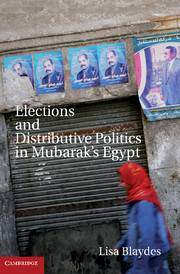Book contents
- Frontmatter
- Contents
- List of Figures
- List of Tables
- Acknowledgments
- 1 Introduction
- 2 Political and Economic Change since 1952
- 3 Elections and Elite Management
- 4 The Politics of Infrastructure Provision
- 5 Electoral Budget Cycles and Economic Opportunism
- 6 Vote Buying, Turnout, and Spoiled Ballots
- 7 Elections and Elite Corruption
- 8 Elections and the Muslim Brotherhood
- 9 Liberal Intellectuals and the Demand for Democratic Change
- 10 Foreign Pressure and Institutional Change
- 11 Egypt in Comparative Perspective
- 12 Conclusion
- Bibliography
- Index
7 - Elections and Elite Corruption
Published online by Cambridge University Press: 04 February 2011
- Frontmatter
- Contents
- List of Figures
- List of Tables
- Acknowledgments
- 1 Introduction
- 2 Political and Economic Change since 1952
- 3 Elections and Elite Management
- 4 The Politics of Infrastructure Provision
- 5 Electoral Budget Cycles and Economic Opportunism
- 6 Vote Buying, Turnout, and Spoiled Ballots
- 7 Elections and Elite Corruption
- 8 Elections and the Muslim Brotherhood
- 9 Liberal Intellectuals and the Demand for Democratic Change
- 10 Foreign Pressure and Institutional Change
- 11 Egypt in Comparative Perspective
- 12 Conclusion
- Bibliography
- Index
Summary
Why do political entrepreneurs run for parliamentary seats when parliament has almost no influence over policy? Aside from the prestige associated with holding public office, a parliamentary seat offers innumerable opportunities. Serving in parliament can act as a stepping stone to cabinet positions or promotions within the party. But to what end? Ultimately, policy decisions are made at the top, so for those interested in policy change, this is an ineffective route to political influence.
It is common knowledge, however, that holding office can personally enrich an individual, both in developed and developing countries, and that rent seeking (and seizing) can serve as significant motivation to compete for political office. In this chapter, I make three points about rent seeking and the electoral connection in Egypt. First, I argue that Egyptian legislators enjoy a myriad of licit and illicit money-making opportunities. Perhaps most important among these involve laws and norms establishing unusually high guarantees of parliamentary immunity. Although the formal institution of parliamentary immunity – or the granting of protection from prosecution for their actions as parliamentarians – has historically been used to protect legislators from civil actions for libel or defamation, some countries have developed informal norms that allow parliamentarians to engage in corrupt and illegal activities with impunity. In Egypt, a desire to enjoy the benefits of parliamentary immunity, or rather the norms that have come to be associated with immunity, has become a major motivation for legislative office seeking in Egypt.
- Type
- Chapter
- Information
- Elections and Distributive Politics in Mubarak’s Egypt , pp. 125 - 147Publisher: Cambridge University PressPrint publication year: 2010

